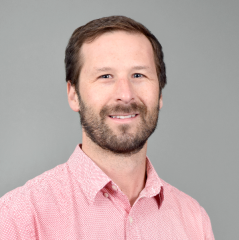It isn’t every day the humanities and sciences combine their research, but when they do something new is created and explored. Such will be the case for a new research project, “Philosophy of Sustainability Science,” which will have Arizona State University’s C. Tyler DesRoches on the team of researchers.
DesRoches is an assistant professor of philosophy in the School of Historical, Philosophical and Religious Studies and assistant professor of sustainabilityDesRoches is also a senior sustainability scholar in the Julie Ann Wrigley Global Institute of Sustainability. and human well-being in the School of Sustainability. His team was recently awarded a grant from the Helsinki Institute of Sustainability Science in Finland.
The project will look to develop an understanding between sustainability scientists and philosophers to gain an integration of models and concepts from the different disciplines. Specifically, it is looking to focus on behavioral economics and ecological/environmental economics.
“Within philosophy, we hope that more philosophers realize sustainability is not just a buzzword but something that fundamentally challenges our ways of thinking about science, society and our relationship to nature,” said DesRoches. “More widely, we hope sustainability science will become more methodologically and ethically well-grounded on the progress philosophers have been making in philosophy of science. That is, we hope that there’s more interdisciplinary integration between science and philosophy.”
He became interested in interdisciplinarity and sustainability as research fields that philosophers of science have often neglected. As a philosopher of science himself, he hopes to create more dialogue between philosophy and sustainability.
“Sustainability is a concept that crystallizes the numerous challenges that we as a civilization face and are going to face in the coming centuries,” said DesRoches. “We want to do philosophy that matters, not merely the kind of esoteric philosophy in the academy — though we still love knowledge for its own sake.”
He will be working alongside other philosophers of science, including Michiru Nagatsu from the Helsinki Institute of Sustainability, University of Helsinki; Taylor Davis from the Department of Philosophy, Purdue University; and Robert Lepenies from the Helmholtz Centre for Environmental Research.
Nagatsu and DesRoches share a background in the history and philosophy of economics and have known each other for a long time. The chance to work on this project together has been fun for them.

C. Tyler DesRoches, assistant professor of philosophy and of sustainability and human well-being.
“[DesRoches] always replies to my email instantly, like one does to a WhatsApp chat or something,” said Nagatsu. “He's hyperactive. Perhaps, because of that, I don't feel that we are more than 5,000 miles away. Maybe I talk to him more often than I do to some colleagues down the corridor.”
Together, along with the other members of their team, they plan to write a few special issues in philosophy and sustainability journals. DesRoches will also be writing a monograph titled, “Sustainability Without Sacrifice: A Philosophical Analysis of Human Well-Being and Consumption,” which is under contract with Oxford University Press.
Overall, the research team hopes to inform and advance practices by identifying real challenges and ways to tackle them. When asked how the research would be compiled when completed, DesRoches stated the following:
“This is an ongoing interdisciplinary research program that does not have any clear end point. I hope we have a manuscript or two by the end of 2019.”
Top photo courtesy of Pexels.com
More Science and technology

Digital crimes leave data trails; these students built a tool to help explain them
In a courtroom, truth often hinges on storytelling. But when that story involves hex values, file systems, packet captures or metadata time stamps, even the most seasoned judge can struggle to follow…

From traffic systems to trustworthy AI, ASU students are solving problems the world can’t ignore
How do you trust artificial intelligence when it doesn’t know what it doesn’t know? How do you safely move computing systems trained in simulation into the real world, where mistakes carry real…

Did the ribosome begin as a parasite?
The ribosome is one of life’s most remarkable inventions — a tiny molecular machine inside every cell that turns genetic code into the proteins that keep us alive. Yet, for all its importance,…
